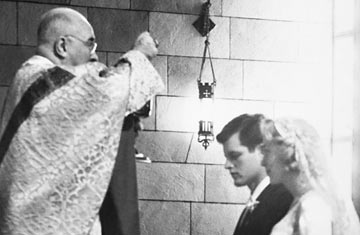
Francis Cardinal Spellman of New York celebrates the Nuptial High Mass as Ted Kennedy weds Joan Bennett at St. Joseph's Church
The wall heading down to the basement in my parents' house is covered with framed photos of friends and family members. Yet hanging right there in the midst of them, next to graduation portraits and vacation snapshots, is a photo of Bobby Kennedy. In that reverential treatment of the Kennedy clan, my parents were far from alone. For million of American Catholics, the election of John Kennedy in 1960 as the first Catholic U.S. President was a personal triumph, and for decades after they showed their pride by hanging pictures of the President and his brothers as if they were part of the family.
It's safe to say that no other American family has been so associated with the word Catholic as the Kennedys. But while they were famously Catholic, the hard-living Kennedys weren't known for being famously devout. So it might come as a surprise that faith played a deep and important role for many of them, including Ted Kennedy. The Rev. Patrick Tarrant, who was at the Senator's bedside the night he died, told ABC News that Kennedy was "a man of quiet prayer." Said the priest: "The whole world knows a certain part of his life very well, but I think there's another part of his life that very few people know, and that is his deep faith."
That faith was instilled by Rose Kennedy, the family matriarch, who for much of her life attended Mass twice daily at St. Francis Xavier in Hyannis Port, where her daughter Eunice was buried last week. Rose's children and grandchildren complained of being coerced to accompany her. But the little church on the Cape provided comfort in the times of tragedy that seemed to visit the Kennedys like the seasons. After their eldest brother Joe died during World War II, John and his sister Kathleen — both of whom sometimes struggled with their faith — would go to St. Francis Xavier together to pray.
Teddy's relationship with the church was uneven. He felt more disconnected from his faith after losing four of his older siblings to early and violent deaths, surviving a plane crash that killed one of his aides, and experiencing the tragedy and scandal of Chappaquiddick. But he continued to pray, even when he wasn't sure it would do much good. In the early 1980s, after the failure of both his marriage and his challenge to take the Democratic presidential nomination from Jimmy Carter, Kennedy would often walk across the street from the Senate office buildings to St. Joseph's parish, where his brother Bobby also used to find solace in prayer.
When Kennedy spoke publicly about religion, it was usually in political — not personal — terms. In 1983, several months after he mistakenly received a fundraising letter from the Moral Majority asking for help battling "ultra-liberals like Ted Kennedy," he accepted an apologetic invitation to speak at Jerry Falwell's Liberty Baptist College (now Liberty University). The Senator delivered an address on the topic of "Faith, Truth and Tolerance," but it was less a personal discussion of his faith than a chance to prove that he wasn't afraid to show up in the lions' den. In a speech that went after critics in the Religious Right, Kennedy quoted Pope John XXIII's words at the start of the Second Vatican Council: "We must beware of those who burn with zeal but are not endowed with much sense."
Kennedy only fully embraced Catholicism later in life, particularly after marrying his second wife. Vicki Kennedy was one of a handful of prominent Catholic Democrats who strongly urged John Kerry to defend questions about his faith during the 2004 presidential campaign, and she served as a surrogate for the Obama campaign in 2008 in heavily Catholic areas. The now retired Monsignor Thomas Duffy remembers the Senator and his wife becoming regular fixtures at the Shrine of the Most Blessed Sacrament in Washington's Chevy Chase neighborhood. "He and Vicki used to come to Mass rather regularly when they were in town," says Duffy, noting that her children also went to confession and attended religion classes. "We sometimes didn't agree on certain issues, but we would always chat."
